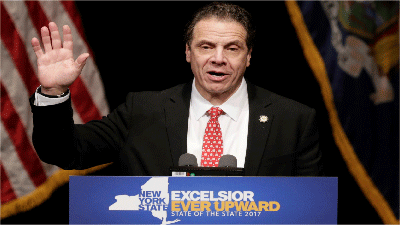New ‘Excelsior’ Program Waives College Tuition to NYS Residents

Cuomo’s scholarship program waives tuition for certain income brackets.
Governor Andrew Cuomo’s tuition-free legislation bill was ratified on April 7, 2017, after initially being proposed in January, making New York the first state to provide free tuition for both four-year and two-year public colleges and universities.
Starting in the fall, families who earn $100,000 or less a year will be eligible for the scholarship, with the maximum income rising to $125,000 in 2019. Although the scholarship, known as the “Excelsior,” excludes room, board and book expenses, it will cover the full cost of tuition. According to Senator Bernie Sanders, this education program is “revolutionary.”
The state’s generosity comes with a caveat: students must live and work in New York State for up to four years after graduation or must pay the state back.
In his defense of this clause, Cuomo posed the question: “Why should New Yorkers pay for your college education and then you pick up and you move to California?” This $87 million investment in education intends to make each student “an asset to the state.”
Many opponents of this condition, including Dr. Sara Goldrick-Rab, author of “Paying the Price: College Costs, Financial Aid and The Betrayal of the American Dream,” view the provision as a major limitation. Dr. Goldrick-Rab refers to it as a “poison pill.”
Around 80,000 State University of New York (SUNY) and 3,000 to 5,000 City
University of New York (CUNY) undergraduates will qualify for the Excelsior scholarship, which means that 90 percent of the state’s community college students and 60 percent of its four-year college students will be ineligible. New York has one of the lowest in-state tuition rates in America. Four-year SUNY schools cost $6,470 and two-year community colleges cost $4,350 for one year. And because Federal Pell grants and state aid often cover those tuition bills, Governor Cuomo stands behind his legislation, which intends to support middle-class families and not necessarily low-income ones.
Former SUNY Chancellor D. Bruce Johnstone expressed his skepticism.
“If you’re really concerned about students who are not attending because of the reality or the perception of unaffordability, this is not the way to help them,” Johnstone said.
Johnstone, along with other skeptics, views the program as exclusive and economically irresponsible. On the other side of the spectrum, many advocates of Excelsior believe that the scholarship will further the conversation regarding eligibility and affordability expansion.
While a large part of the Excelsior’s function is to support middle-income students, it will also establish New York as “the first,” state in the country to make tuition free for not only four-year public universities, but also for two-year community colleges. Now that Cuomo has set the precedent for other states and has “gotten that headline,” according to E.J. McMahon, the founder and Research Director of the Empire Center for Public Policy, Cuomo and his team must now “consider details and confront the possible consequences.”
“The rationale is clear: The Excelsior scholarship, at its core, seeks to create a culture that strives to combine education with job and business creation,” Cuomo said. “It provides middle-class students with the opportunity to go to college for free, and then guides them to use their experience to benefit the state that generously made that education possible.”
While the state will pay out of pocket for tuition costs, the goal of instituting this scholarship is to eventually put those dollars back in the state’s wallet when the Excelsior graduates become business people and taxpayers. This job-driven program, however, comes with some serious drawbacks: by the scholarship’s third year of action, it is projected to cost $163 million, and, despite the broadened accessibility to education, it is still possible that many graduates will continue to be unemployed. The state should relish in its accomplishment while remaining wary of the scholarship’s economic and selective limitations.
Cuomo’s perspective on the Excelsior program is well summed up in his statement on the New York State website.
“In New York State, every child will have the opportunity that education provides.”






